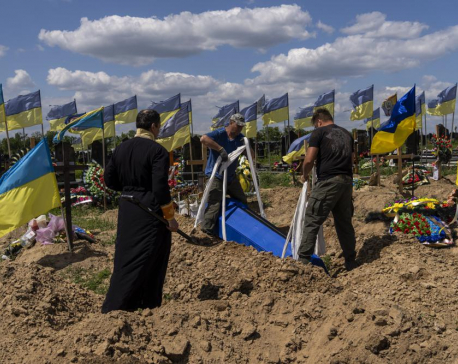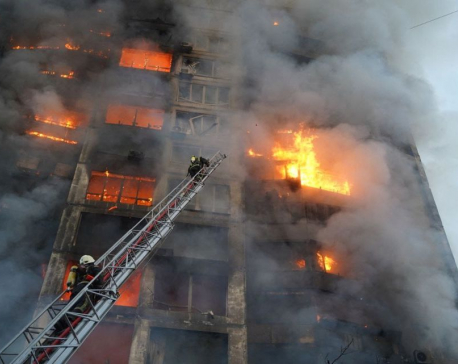
OR
Ukraine reports 300 died in Russian strike on theater
Published On: March 25, 2022 07:19 PM NPT By: Associated Press
_20220325192242.jpeg)
KYIV, Ukraine, March 25: Ukrainian authorities said Friday that about 300 people died when a Russian airstrike last week blew up a theater in Mariupol where hundreds of civilians were sheltering — a catastrophic loss of civilian life that, if confirmed, is likely to further crank up pressure on Western nations to step up military aid.
In a vain attempt to protect those inside from missile and airstrikes that Russia has rained down on cities, an enormous inscription reading “CHILDREN” in Russian had been posted outside the grand, columned theater to make it visible from the air.
For days, the government in the besieged ruins of Mariupol was unable to give a casualty count for the March 16 attack. The post on its Telegram channel Friday cited eyewitnesses, but it was not immediately clear whether emergency workers had finished excavating the theater ruins or how witnesses arrived at the horrific figure of lives lost.
Still, the emerging picture of gruesome casualties could refocus attention on the refusal thus far of countries from the NATO alliance to supply warplanes or fly patrols to protect Ukraine’s airspace, despite repeated pleas from the country’s embattled president.
The scale of devastation in Mariupol, where bodies have laid unburied amid bomb craters and buildings have been hollowed out by relentless attacks, have made information difficult to obtain. But soon after the attack, the Ukrainian Parliament’s human rights commissioner said more than 1,300 people had taken cover in the theater, many of them because their homes were destroyed in Russia’s siege. The building had a basement bomb shelter, and some survivors did emerge from the rubble after the attack.
The new reported death toll came a day after U.S. President Joe Biden and allied leaders promised that more military aid for Ukraine was coming. But they stopped short of providing the heavy weaponry that Ukrainian President Volodymyr Zelenskyy said is urgently needed. NATO nations fear that providing planes, tanks and the no-fly zone in Ukraine’s airspace could increase the risk of them being drawn into direct conflict with Russia.
The U.S. and the European Union on Friday did announce a move to further squeeze Russia economically: a partnership to reduce Europe’s reliance on Russian energy and slowly dry up the billions of dollars the Kremlin gets from sales of fossil fuels.
Even without a direct conflict between Russian and NATO forces, Europe’s most serious security crisis since World War II pushed relations toward breaking point. The Kremlin is bristling at the tightening noose of sanctions around Russia’s economy, currency and business leaders accused of being supportive of President Vladimir Putin. His foreign minister, Sergey Lavrov, on Friday characterized the Western pressure as “a real hybrid war, total war.”
“And the goals are not hidden,” he continued, “they are declared publicly — to destroy, break, annihilate, strangle the Russian economy, and Russia on the whole.”
In Ukrainian towns and cities that day-by-day increasingly resemble the ruins that Russian forces left behind in previous campaigns in Syria and Chechnya, the misery for civilians grows ever more acute.
Those who can are trying to flee, emptying out their cities. In relentlessly shelled Kharkiv, mostly elderly women came to collect food and other urgent supplies. In the capital of Kyiv, ashes of the dead are piling up at the main crematorium because so many relatives have left, leaving urns unclaimed.
Meanwhile, the vulnerable — the elderly, children and others unable to join millions heading westward — face food shortages in a country once known as the breadbasket for the world.
Fidgeting with anticipation, a young girl in Kharkiv watched intently this week as a volunteer’s knife cut through a giant slab of cheese, carving out thick slices — one for each hungry person waiting stoically in line.
Hanna Spitsyna took charge of divvying up the delivery of food aid from the Ukrainian Red Cross, handing it out to her neighbors. Each got a lump of the cheese that was cut under the child’s watchful gaze, dropped chunk by chunk into plastic bags that people in line held open like hungry mouths.
“They brought us aid, brought us aid for the elderly women that stayed here,” Spitsyna said. “All these people need diapers, swaddle blankets and food.”
Unable to sweep with lightning-quick speed into Kyiv, the apparent aim on Feb. 24 when the Kremlin launched the war, Russian forces are instead raining down shells and missiles on cities from afar. Kyiv, like other cities, has seen its population dramatically reduced in the vast refugee crisis that has seen more than 10 million displaced, including at least 3.5 million who have fled the country entirely.
Russia’s military claimed Friday that it destroyed a massive Ukrainian fuel base used to supply the Kyiv region’s defenses, with ships firing a salvo of cruise missiles, according to the Interfax news agency. Videos on social media showed an enormous fireball explosion near the capital.
The outskirts of Kharkiv were shrouded by foggy smoke Friday, with shelling constant since early in the morning. In a city hospital, several wounded soldiers arrived, with bullet and shrapnel wounds, a day after doctors treated a dozen civilians. Even as doctors stabilized the direst case, the sound of shelling could be heard in the surgery ward.
At an emergency NATO summit in Brussels on Thursday, Zelenskyy pleaded with the Western allies via video for planes, tanks, rockets, air defense systems and other weapons, saying his country is “defending our common values.”
The invasion has sharpened an energy and moral dilemma for European nations that heat homes and power industries with Russian fossil fuels. Alarmed that the billions they pay can be channeled by the Kremlin toward its war effort, they’re speeding up hunts for alternatives.
Germany said Friday that it has forged contracts with new suppliers that will significantly reduce its reliance on Russian coal, gas and oil in coming weeks. Biden said the new U.S.-EU gas-supply partnership will help undercut Putin’s use of energy sales to “coerce and manipulate his neighbors” and “drive his war machine.” Under the plan, the U.S. and other nations will increase liquified natural gas exports to Europe by 15 billion cubic meters this year.
While millions of Ukrainians have fled west, Ukraine accused Moscow of forcibly removing hundreds of thousands of civilians from shattered cities to Russia to pressure Kyiv to give up. Lyudmyla Denisova, Ukraine’s ombudsperson, said 402,000 people, including 84,000 children, had been taken against their will into Russia, where some may be used as “hostages” to pressure Kyiv to surrender.
The Kremlin gave nearly identical numbers for those who have been relocated, but said they were from predominantly Russian-speaking regions of Donetsk and Luhansk in eastern Ukraine and wanted to go to Russia. Pro-Moscow separatists have been fighting for control for nearly eight years in those regions, where many people have supported close ties to Russia.
—In Chernihiv, where an airstrike this week destroyed a crucial bridge, a city official, Olexander Lomako, said a “humanitarian catastrophe” is unfolding as Russian forces target food storage places. He said about 130,000 people are left in the besieged city, about half its prewar population.
—Russia said it will offer safe passage starting Friday to 67 ships from 15 foreign countries that are stranded in Ukrainian ports because of the danger of shelling and mines.
— The International Atomic Energy Agency said it has been told by Ukrainian authorities that Russian shelling is preventing worker rotations in and out of the Chernobyl nuclear plant. It said Russian forces have shelled Ukrainian checkpoints in the city of Slavutych, home to many Chernobyl nuclear workers, “putting them at risk and preventing further rotation of personnel to and from the site.”
You May Like This

Ukraine: 200 bodies found in basement in Mariupol’s ruins
KYIV, Ukraine, May 24: Workers digging through the rubble of an apartment building in Mariupol found 200 bodies in the... Read More...
_20220424081054.jpeg)
Ukraine battered again; Zelenskyy says US officials to visit
KYIV, Ukraine, April 24: Russian forces in Ukraine tried to storm a steel plant housing soldiers and civilians in the southern city... Read More...

Biden plans first Europe visit since Ukraine invasion as refugees surpass 3 million
LVIV, Ukraine/KYIV, March 16: U.S. President Joe Biden will make his first visit to Europe since the invasion of Ukraine... Read More...










Just In
- Heavy rainfall likely in Bagmati and Sudurpaschim provinces
- Bangladesh protest leaders taken from hospital by police
- Challenges Confronting the New Coalition
- NRB introduces cautiously flexible measures to address ongoing slowdown in various economic sectors
- Forced Covid-19 cremations: is it too late for redemption?
- NRB to provide collateral-free loans to foreign employment seekers
- NEB to publish Grade 12 results next week
- Body handover begins; Relatives remain dissatisfied with insurance, compensation amount







Leave A Comment